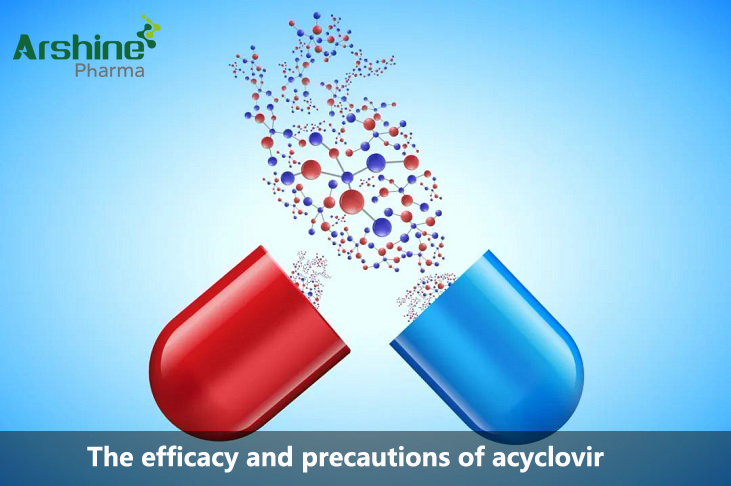
Introduction: Acyclovir is a widely used antiviral medication belonging to the nucleoside analog class. It has been an essential therapeutic agent in the management of viral infections, particularly those caused by the herpes simplex virus (HSV) and varicella-zoster virus (VZV). Acyclovir's efficacy lies in its ability to inhibit viral DNA replication, thereby reducing viral proliferation and promoting the resolution of infections. In this article, we will explore the mechanisms of action, clinical efficacy, and precautions associated with acyclovir to ensure its safe and effective use in the management of viral infections.
-
Mechanisms of Action: Acyclovir exerts its antiviral effects through a selective mechanism of action. Following oral or intravenous administration, acyclovir undergoes a series of phosphorylation steps by viral and cellular enzymes. The active triphosphate form of acyclovir is then incorporated into the viral DNA chain during replication. However, because acyclovir lacks the 3'-hydroxyl group essential for further DNA elongation, viral DNA synthesis is terminated, inhibiting viral replication. Importantly, acyclovir's selectivity for viral thymidine kinase enzymes ensures minimal impact on the host cell's DNA synthesis, reducing the risk of adverse effects.
-
Efficacy against Herpes Simplex Virus (HSV) Infections: Acyclovir has demonstrated excellent clinical efficacy in the treatment and prevention of HSV infections. It is widely used for genital herpes, oral herpes (cold sores), and herpes keratitis. Oral acyclovir therapy can shorten the duration of acute herpes episodes, reduce viral shedding, and alleviate symptoms, providing significant relief to patients. Additionally, acyclovir prophylaxis has been proven effective in reducing the frequency and severity of recurrent herpes outbreaks.
-
Varicella-Zoster Virus (VZV) Infections: Acyclovir is a first-line treatment for varicella-zoster virus infections, commonly known as chickenpox and shingles. In patients with chickenpox, acyclovir can reduce the severity of symptoms, hasten the healing of skin lesions, and prevent complications in high-risk individuals. For shingles (herpes zoster), acyclovir is particularly beneficial when initiated early in the course of the disease, as it can reduce the duration and severity of acute pain, promote rash healing, and decrease the likelihood of postherpetic neuralgia.
-
Other Herpesvirus Infections: Acyclovir is effective against other herpesviruses as well, including Epstein-Barr virus (EBV) and cytomegalovirus (CMV). It is commonly used for the treatment of severe or disseminated CMV infections in immunocompromised patients. However, its efficacy against EBV-associated diseases, such as infectious mononucleosis and some lymphoproliferative disorders, remains under investigation.
-
Prophylaxis in Immunocompromised Patients: Acyclovir is frequently employed as prophylaxis in immunocompromised patients, such as those undergoing organ transplantation or receiving chemotherapy. Prophylactic use helps prevent reactivation of latent herpesviruses, which can cause significant morbidity and mortality in immunosuppressed individuals. By reducing viral replication and shedding, acyclovir prophylaxis aids in maintaining immunocompromised patients' health and preventing severe complications.
-
Topical Formulations: Topical acyclovir formulations, such as creams and ointments, are commonly used for the treatment of localized HSV infections, such as cold sores. These topical agents can accelerate lesion healing and alleviate discomfort. However, topical acyclovir may be less effective in more extensive or recurrent lesions, where systemic therapy is often preferred.
-
Precautions and Adverse Effects: While generally well-tolerated, acyclovir is not without potential adverse effects and precautions. The most common side effects include nausea, vomiting, diarrhea, and headache. Patients with known hypersensitivity to acyclovir or valacyclovir should avoid its use. Renal function should be monitored regularly, especially in patients receiving high-dose intravenous acyclovir, as nephrotoxicity can occur in some cases. Adequate hydration is recommended during intravenous acyclovir therapy to minimize the risk of renal impairment.
-
Pregnancy and Breastfeeding: Acyclovir has been widely used in pregnancy for the management of herpes infections. Studies have not indicated any significant adverse effects on the developing fetus, but its use during pregnancy should be carefully considered, particularly in the first trimester. The decision to use acyclovir in pregnant women should be based on individual risk-benefit assessments. Acyclovir is excreted in breast milk, but the concentrations are low, and the benefits of treatment for the mother often outweigh the potential risk to the nursing infant.
-
Drug Interactions: Acyclovir may interact with other medications, affecting their metabolism and efficacy. Concurrent use of probenecid, for example, can lead to increased acyclovir levels and prolonged drug elimination. Healthcare professionals should carefully review the patient's medication profile and consider potential drug interactions before prescribing acyclovir.
-
Resistance and Viral Mutations: As with any antiviral agent, prolonged or inappropriate use of acyclovir can lead to the development of viral resistance. Monitoring for viral mutations and acyclovir resistance is essential, especially in immunocompromised patients or those with recurrent infections. If resistance is suspected, alternative antiviral therapies or combination treatments may be necessary.
Conclusion: Acyclovir's efficacy as an antiviral agent in the management of herpes simplex and varicella-zoster virus infections is well-established. Its selective mechanism of action and minimal host cell toxicity make it a valuable therapeutic option for a wide range of patients. Healthcare professionals should be vigilant in monitoring renal function during acyclovir therapy and educate patients about potential side effects. Proper patient assessment, adherence to dosing guidelines, and consideration of individual patient factors are crucial in ensuring the safe and effective use of acyclovir in the management of viral infections. Continuous research and surveillance for viral resistance are essential to maintain acyclovir's clinical effectiveness and inform future antiviral strategies.
